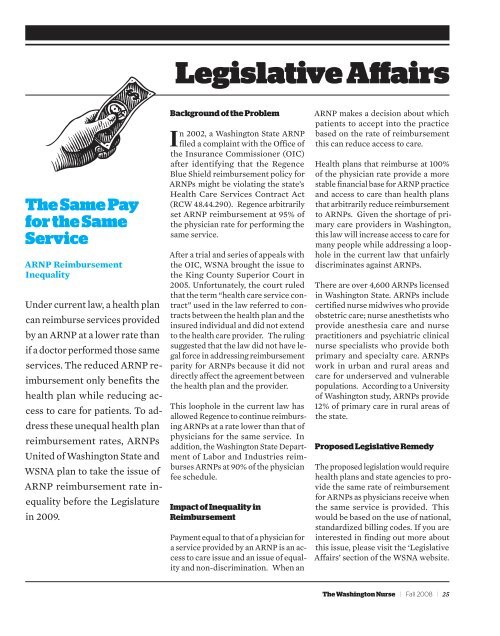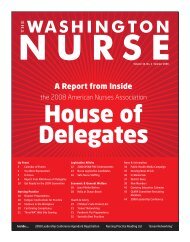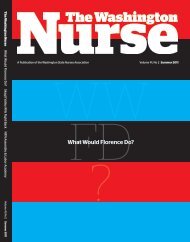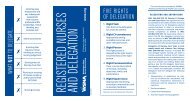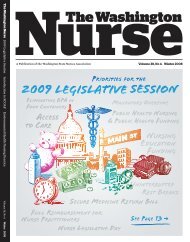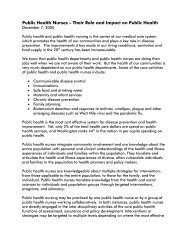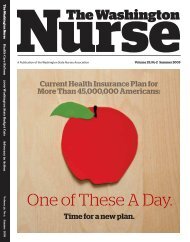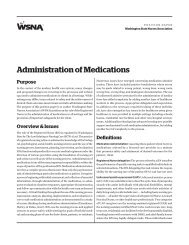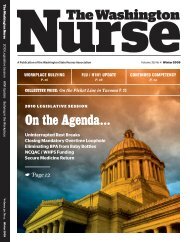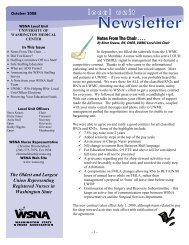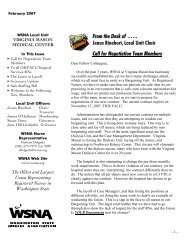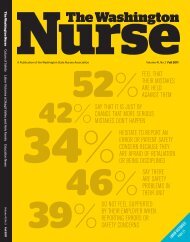Issue 38.3 - Fall 2008 - The Washington State Nurses Association
Issue 38.3 - Fall 2008 - The Washington State Nurses Association
Issue 38.3 - Fall 2008 - The Washington State Nurses Association
Create successful ePaper yourself
Turn your PDF publications into a flip-book with our unique Google optimized e-Paper software.
Legislative Affairs<br />
<strong>The</strong> Same Pay<br />
for the Same<br />
Service<br />
ARNP Reimbursement<br />
Inequality<br />
Under current law, a health plan<br />
can reimburse services provided<br />
by an ARNP at a lower rate than<br />
if a doctor performed those same<br />
services. <strong>The</strong> reduced ARNP reimbursement<br />
only benefits the<br />
health plan while reducing access<br />
to care for patients. To address<br />
these unequal health plan<br />
reimbursement rates, ARNPs<br />
United of <strong>Washington</strong> <strong>State</strong> and<br />
WSNA plan to take the issue of<br />
ARNP reimbursement rate inequality<br />
before the Legislature<br />
in 2009.<br />
Background of the Problem<br />
In 2002, a <strong>Washington</strong> <strong>State</strong> ARNP<br />
filed a complaint with the Office of<br />
the Insurance Commissioner (OIC)<br />
after identifying that the Regence<br />
Blue Shield reimbursement policy for<br />
ARNPs might be violating the state’s<br />
Health Care Services Contract Act<br />
(RCW 48.44.290). Regence arbitrarily<br />
set ARNP reimbursement at 95% of<br />
the physician rate for performing the<br />
same service.<br />
After a trial and series of appeals with<br />
the OIC, WSNA brought the issue to<br />
the King County Superior Court in<br />
2005. Unfortunately, the court ruled<br />
that the term “health care service contract”<br />
used in the law referred to contracts<br />
between the health plan and the<br />
insured individual and did not extend<br />
to the health care provider. <strong>The</strong> ruling<br />
suggested that the law did not have legal<br />
force in addressing reimbursement<br />
parity for ARNPs because it did not<br />
directly affect the agreement between<br />
the health plan and the provider.<br />
This loophole in the current law has<br />
allowed Regence to continue reimbursing<br />
ARNPs at a rate lower than that of<br />
physicians for the same service. In<br />
addition, the <strong>Washington</strong> <strong>State</strong> Department<br />
of Labor and Industries reimburses<br />
ARNPs at 90% of the physician<br />
fee schedule.<br />
Impact of Inequality in<br />
Reimbursement<br />
Payment equal to that of a physician for<br />
a service provided by an ARNP is an access<br />
to care issue and an issue of equality<br />
and non-discrimination. When an<br />
ARNP makes a decision about which<br />
patients to accept into the practice<br />
based on the rate of reimbursement<br />
this can reduce access to care.<br />
Health plans that reimburse at 100%<br />
of the physician rate provide a more<br />
stable financial base for ARNP practice<br />
and access to care than health plans<br />
that arbitrarily reduce reimbursement<br />
to ARNPs. Given the shortage of primary<br />
care providers in <strong>Washington</strong>,<br />
this law will increase access to care for<br />
many people while addressing a loophole<br />
in the current law that unfairly<br />
discriminates against ARNPs.<br />
<strong>The</strong>re are over 4,600 ARNPs licensed<br />
in <strong>Washington</strong> <strong>State</strong>. ARNPs include<br />
certified nurse midwives who provide<br />
obstetric care; nurse anesthetists who<br />
provide anesthesia care and nurse<br />
practitioners and psychiatric clinical<br />
nurse specialists who provide both<br />
primary and specialty care. ARNPs<br />
work in urban and rural areas and<br />
care for underserved and vulnerable<br />
populations. According to a University<br />
of <strong>Washington</strong> study, ARNPs provide<br />
12% of primary care in rural areas of<br />
the state.<br />
Proposed Legislative Remedy<br />
<strong>The</strong> proposed legislation would require<br />
health plans and state agencies to provide<br />
the same rate of reimbursement<br />
for ARNPs as physicians receive when<br />
the same service is provided. This<br />
would be based on the use of national,<br />
standardized billing codes. If you are<br />
interested in finding out more about<br />
this issue, please visit the ‘Legislative<br />
Affairs’ section of the WSNA website.<br />
<strong>The</strong> <strong>Washington</strong> Nurse | <strong>Fall</strong> <strong>2008</strong> | 25


